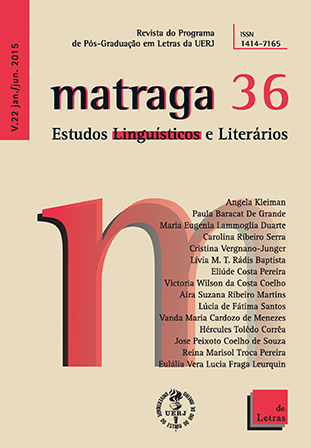A TECNOLOGIA EDUCACIONAL E O LETRAMENTO DIGITAL NA ESCOLA PÚBLICA: ALGUM ESTRANHO NO NINHO?
Palavras-chave:
Tecnologia educacional. Multiletramentos. Letramento digital.Resumo
Os estudos sobre os letramentos têm apontado para a necessidade de redimensionamentos ontológicos e paradigmáticos quanto à compreensão das diversas práticas letradas e sua relação com os sujeitos na sociedade contemporânea e tal é o caso das práticas que envolvem as tecnologias e ambientes digitais no âmbito escolar. Assim, a fim de conhecer como o letramento digital vem sendo inserido nas práticas de linguagens, na educação básica, realizou-se uma investigação em uma escola pública, que oferta o Ensino Médio. Tratou-se de um estudo de caso, em que examinou a relação entre diferentes contextos condicionantes da inserção do letramento digital: o prescritivo e orientativo; o das condições físicas; o da formação docente; e, por fim, o das práticas. Como fundamentação teórica, o trabalho se embasou, principalmente, nas contribuições dos Novos Estudos do Letramento (PAHL & ROWSELL, 2012), no pressuposto do letramento como prática social (STREET, 1984, 2003; LANKSHEAR & KNOBEL, 2006, 2011) bem como na proposta da pedagogia dos multiletramentos (CAZDEN et al., 1996; ROJO, 2009, 2012), em especial, quanto à concepção de letramento digital (MARTIN, 2008). No presente trabalho, confrontamos dois dos contextos citados, a saber, o prescritivo e orientativo e o das práticas e a análise permitiu observar os seguintes aspectos: a falta de sintonia entre esses contextos; a inclusão mínima do letramento digital, no currículo escolar; a inserção ainda incipiente e pontual desse letramento nas práticas, além de estas não considerarem as experiências sociodiscursivas e interacionais dos alunos exteriores à escola.
Downloads
Downloads
Publicado
Como Citar
Edição
Seção
Licença
AUTORIZAÇÃO
A Matraga – Revista do Programa de Pós-Graduação em Letras da UERJ está autorizada a publicar o artigo ora submetido, caso seja aceito para publicação online. Fica atestado que a contribuição é original, que não está sendo submetida a outro editor para publicação, e que a presente declaração é a expressão da verdade.
Os trabalhos publicados no espaço virtual da Matraga – Revista do Programa de Pós-Graduação em Letras da UERJ serão automaticamente cedidos, ficando os seus direitos autorais reservados à Matraga. Sua reprodução, total ou parcial, é condicionada à citação dos autores e dos dados da publicação.

A Matraga utiliza uma Licença Creative Commons - Atribuição-NãoComercial 4.0 Internacional.





